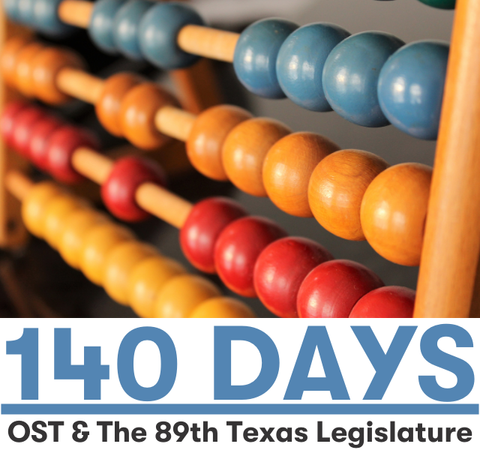Budget Progress & Public Education Negotiations
April 3, 2025

With 59 days to go, the Texas Legislature is moving quickly to advance the one bill that must pass before legislators adjourn Sine Die on June 2: the state budget. Last week, the Senate passed its version—SB 1—and sent it to the House for consideration. The Appropriations Committee, which has been debating its own version, inserted its draft into the ‘shell’ of SB 1 and has sent it to the full House for debate by all 150 members.
The Senate’s budget totaled $336 billion in funding for the next two years, spending more than $150 billion in general revenue. Importantly, this amount does not include roughly $40 billion more that is available—though some of that money requires a decision by legislators to ‘bust the spending cap,’ a limit they’ve set to constrain budgetary growth from biennium to biennium. A full review of the proposed budget can be found here.
In addition, in the House the powerful Calendars Committee, which sets the daily debate agenda for the chamber, typically sets ‘calendar rules’ for large bills. These rules require pre-filing of amendments so that the body is able to review them in their entirety instead of making decisions in the moment during debate.
The bill is set at the top of the House calendar on April 10. This is one of the most exciting and longest days to watch decision makers in the lower chamber. If you want to watch the action, you can access a live stream here.
Debate on school finance policy also continues in the House, where a committee hearing scheduled for Tuesday was canceled after news about changes to both of its pending proposals, HB 2 and HB 3. Proposed changes to the filed legislation include adding a cap on the amount of money the state can spend on education savings accounts, or ESAs, and raising the basic allotment, the primary driver of school finance appropriations, by $359 per student and including automatic increases in the future tied to property value growth.
The current draft of HB 3 includes revisions to the state’s ADSY program, which allows school districts to draw down funding for optional summer enrichment. If the current proposed changes are adopted, the program will generate more flexibility for districts that operate fewer than 180 days per year and expand the program to include middle school students.
TXPOST has been communicating with key decision makers to support these expansions in the program and creating a similar program that would allow districts to draw down funds for afterschool. We know that students see academic improvement and increased attendance when they participate regularly in high-quality programs, giving them more opportunities to learn and grow.
On the community-based side, TXPOST has worked with Chairman Trent Ashby (R-Lufkin) and his office to file HB 3672. The bill would create a grant program to fund community-based programming across the state. TXPOST is working with leadership to have this bill set for a hearing and continue to move it through the legislative process. Should we get it passed in the House, it would then go to the Senate for consideration.

